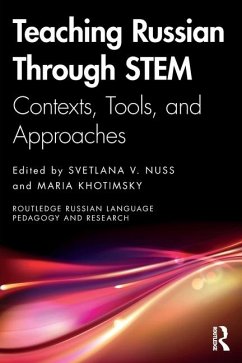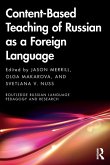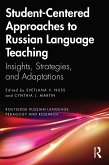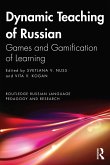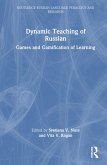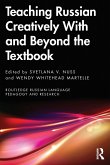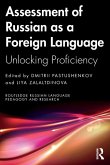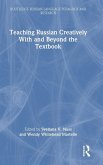Teaching Russian Through STEM
Contexts, Tools, and Approaches
Herausgeber: Nuss, Svetlana V.; Khotimsky, Maria
Teaching Russian Through STEM
Contexts, Tools, and Approaches
Herausgeber: Nuss, Svetlana V.; Khotimsky, Maria
- Broschiertes Buch
- Merkliste
- Auf die Merkliste
- Bewerten Bewerten
- Teilen
- Produkt teilen
- Produkterinnerung
- Produkterinnerung
Teaching Russian Through STEM: Contexts, Tools, and Approaches addresses the growing demand for language courses that align with the interests of students who are increasingly majoring in the fields of science, technology, engineering, and mathematics.
Andere Kunden interessierten sich auch für
![Content-Based Teaching of Russian as a Foreign Language Content-Based Teaching of Russian as a Foreign Language]() Content-Based Teaching of Russian as a Foreign Language59,99 €
Content-Based Teaching of Russian as a Foreign Language59,99 €![Student-Centered Approaches to Russian Language Teaching Student-Centered Approaches to Russian Language Teaching]() Student-Centered Approaches to Russian Language Teaching48,99 €
Student-Centered Approaches to Russian Language Teaching48,99 €![Dynamic Teaching of Russian Dynamic Teaching of Russian]() Dynamic Teaching of Russian38,99 €
Dynamic Teaching of Russian38,99 €![Dynamic Teaching of Russian Dynamic Teaching of Russian]() Dynamic Teaching of Russian154,99 €
Dynamic Teaching of Russian154,99 €![Teaching Russian Creatively With and Beyond the Textbook Teaching Russian Creatively With and Beyond the Textbook]() Teaching Russian Creatively With and Beyond the Textbook43,99 €
Teaching Russian Creatively With and Beyond the Textbook43,99 €![Assessment of Russian as a Foreign Language Assessment of Russian as a Foreign Language]() Assessment of Russian as a Foreign Language65,99 €
Assessment of Russian as a Foreign Language65,99 €![Teaching Russian Creatively With and Beyond the Textbook Teaching Russian Creatively With and Beyond the Textbook]() Teaching Russian Creatively With and Beyond the Textbook154,99 €
Teaching Russian Creatively With and Beyond the Textbook154,99 €-
-
-
Teaching Russian Through STEM: Contexts, Tools, and Approaches addresses the growing demand for language courses that align with the interests of students who are increasingly majoring in the fields of science, technology, engineering, and mathematics.
Produktdetails
- Produktdetails
- Routledge Russian Language Pedagogy and Research
- Verlag: Taylor & Francis Ltd
- Seitenzahl: 280
- Erscheinungstermin: 30. Dezember 2024
- Englisch
- Abmessung: 234mm x 156mm x 15mm
- Gewicht: 432g
- ISBN-13: 9781032620657
- ISBN-10: 103262065X
- Artikelnr.: 71300472
- Herstellerkennzeichnung
- Libri GmbH
- Europaallee 1
- 36244 Bad Hersfeld
- gpsr@libri.de
- Routledge Russian Language Pedagogy and Research
- Verlag: Taylor & Francis Ltd
- Seitenzahl: 280
- Erscheinungstermin: 30. Dezember 2024
- Englisch
- Abmessung: 234mm x 156mm x 15mm
- Gewicht: 432g
- ISBN-13: 9781032620657
- ISBN-10: 103262065X
- Artikelnr.: 71300472
- Herstellerkennzeichnung
- Libri GmbH
- Europaallee 1
- 36244 Bad Hersfeld
- gpsr@libri.de
Svetlana V. Nuss teaches Russian at the University of Alaska (USA) and online graduate courses in the Bilingual Education and TESOL Certification program at Grand Canyon University (USA). As a teacher educator with expertise in a low-incidence EL setting, Dr. Nuss works with school districts developing their EL coaching programs for teachers. Maria Khotimsky received her Ph.D. from the Department of Slavic Languages and Literatures at Harvard University (USA). Dr. Khotimsky has been teaching at the Massachusetts Institute of Technology (USA) since the fall of 2012, restarting the Russian language program there after a 15-year hiatus. Her research interests include language pedagogy (using digital technology and content-based courses), STEM and language learning, translation studies, and translingual poetry.
Part I
Contextualizing the teaching of Russian as a foreign language through STEM
1. History and modern practices of integrating STEM in the teaching of
Russian as a new or heritage language
2. Pathways for engaging climate, energy, and sustainability in the Russian
language classroom
3. Maximizing student learning outcomes in 'Scientific Russian': A case
study
4. Designing content-based STEM modules for teaching advanced Russian
Part II
Engaging diverse audiences and professional fields
5. STEM-based intensive summer language program Russian in the Sky and
Outer Space
6. Russian for construction professionals in secondary vocational schools
Part III
Harnessing the power of corpus: New approaches to material development and
textbook evaluation
7. Russian for Special Purposes: Corpus-based approaches to vocabulary
selection
8. Mathematicon: A corpus-based platform for teachers and students of RFL
9. A CLIL perspective on content, procedures, and language: Comparing
instructions in elementary school science teaching materials
Part IV
Expanding pedagogical horizons in teaching Russian through STEM
10. Pedagogy of Teaching Russian Through STEM in the 21st Century
Contextualizing the teaching of Russian as a foreign language through STEM
1. History and modern practices of integrating STEM in the teaching of
Russian as a new or heritage language
2. Pathways for engaging climate, energy, and sustainability in the Russian
language classroom
3. Maximizing student learning outcomes in 'Scientific Russian': A case
study
4. Designing content-based STEM modules for teaching advanced Russian
Part II
Engaging diverse audiences and professional fields
5. STEM-based intensive summer language program Russian in the Sky and
Outer Space
6. Russian for construction professionals in secondary vocational schools
Part III
Harnessing the power of corpus: New approaches to material development and
textbook evaluation
7. Russian for Special Purposes: Corpus-based approaches to vocabulary
selection
8. Mathematicon: A corpus-based platform for teachers and students of RFL
9. A CLIL perspective on content, procedures, and language: Comparing
instructions in elementary school science teaching materials
Part IV
Expanding pedagogical horizons in teaching Russian through STEM
10. Pedagogy of Teaching Russian Through STEM in the 21st Century
Part I
Contextualizing the teaching of Russian as a foreign language through STEM
1. History and modern practices of integrating STEM in the teaching of
Russian as a new or heritage language
2. Pathways for engaging climate, energy, and sustainability in the Russian
language classroom
3. Maximizing student learning outcomes in 'Scientific Russian': A case
study
4. Designing content-based STEM modules for teaching advanced Russian
Part II
Engaging diverse audiences and professional fields
5. STEM-based intensive summer language program Russian in the Sky and
Outer Space
6. Russian for construction professionals in secondary vocational schools
Part III
Harnessing the power of corpus: New approaches to material development and
textbook evaluation
7. Russian for Special Purposes: Corpus-based approaches to vocabulary
selection
8. Mathematicon: A corpus-based platform for teachers and students of RFL
9. A CLIL perspective on content, procedures, and language: Comparing
instructions in elementary school science teaching materials
Part IV
Expanding pedagogical horizons in teaching Russian through STEM
10. Pedagogy of Teaching Russian Through STEM in the 21st Century
Contextualizing the teaching of Russian as a foreign language through STEM
1. History and modern practices of integrating STEM in the teaching of
Russian as a new or heritage language
2. Pathways for engaging climate, energy, and sustainability in the Russian
language classroom
3. Maximizing student learning outcomes in 'Scientific Russian': A case
study
4. Designing content-based STEM modules for teaching advanced Russian
Part II
Engaging diverse audiences and professional fields
5. STEM-based intensive summer language program Russian in the Sky and
Outer Space
6. Russian for construction professionals in secondary vocational schools
Part III
Harnessing the power of corpus: New approaches to material development and
textbook evaluation
7. Russian for Special Purposes: Corpus-based approaches to vocabulary
selection
8. Mathematicon: A corpus-based platform for teachers and students of RFL
9. A CLIL perspective on content, procedures, and language: Comparing
instructions in elementary school science teaching materials
Part IV
Expanding pedagogical horizons in teaching Russian through STEM
10. Pedagogy of Teaching Russian Through STEM in the 21st Century

